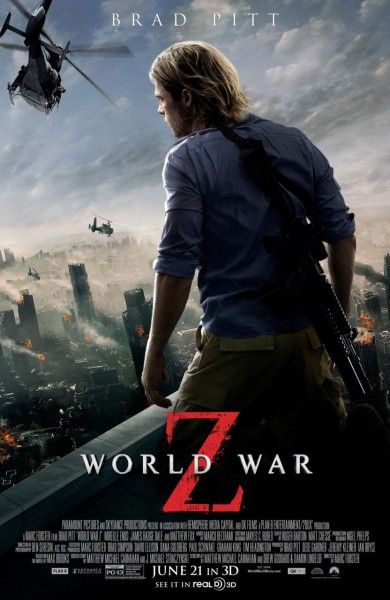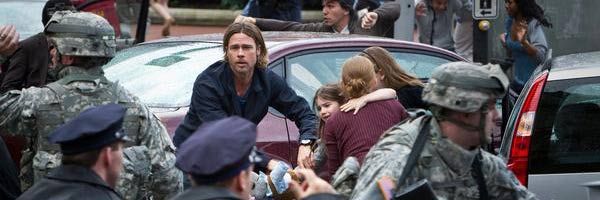Paramount almost didn't make a PG-13 blockbuster adaptation of Max Brooks' zombie novel World War Z, and that would have probably been for the best. The project, which was envisioned as the first part of a potential trilogy, would have been dead if the movie didn't get a co-financier, but the studio eventually found partners in producer Graham King's GK Films and David Ellison's Skydance Productions. Now they're all paying the price as the production has spun wildly out of control, soared to more than a $170 million budget, requires five weeks of complex reshoots (others have put the number at 7-8 weeks), and brought in Lost co-creator Damon Lindelof to do re-writes on a picture that won't be able to get back in front of cameras until September.So how did production on World War Z go so horribly wrong? Hit the jump for more. According to The Hollywood Reporter, producer and star Brad Pitt made the critical error of selecting Marc Forster (Quantum of Solace) as the movie's director. Quantum was Forster's only other big budget feature, and he's never shown much vision or personality in his films. If anything, he's an unimaginative journeyman who can be far too heavy-handed (e.g. a scene in his last picture Machine Gun Preacher where a small child gets killed by a land mine and Forster felt the need to play up this moment with a soaring bit of score).It turns out that Forster also didn't have a clear direction when approaching World War Z, and the rudderless ship began to sink. To be fair, Forster "was not allowed to bring on his usual team", because the production felt he needed more seasoned supporting players like line producer Colin Wilson (Avatar) and Oscar-winning effects man John Nelson (Gladiator), and Oscar-winning cinematographer Robert Richardson (Hugo), all of whom were eventually replaced. Furthermore, Pitt was absent during pre-production since he was busy filming Killing Them Softly and then wanted to spend time with family. And in October, "a Hungarian anti-terrorism unit raided an airport warehouse and confiscated 85 fully functional automatic assault rifles that were to be used on the shoot."But Forster has to shoulder the blame for a number of the film's other problems. The director reportedly hadn't even decided how the zombies were supposed to look and move even though the start of production was only three weeks away. The plan to support Forster's "vision" with strong below-the-line talent fell apart when no vision materialized, and a power vacuum opened up as various players attempted to find a direction for the movie. For example, Richardson "struggled to impose order, antagonizing other crew members in the process. A colleague says Richardson is highly gifted but doesn’t respond well to weakness at the top. 'If you waffle at all, you get slammed,' he says."Paramount may not have understood the magnitude of the problems until it was too late. According to THR:It was unclear to several people working on the film whether Paramount was fully aware of the mounting issues, including the insufficient time allotted for the shoot. While [second-unit director Simon] Crane is said to have wanted 60 days or more for second-unit work, for example, the schedule called for about a third of that. Some insiders expected that Pitt could use his influence with [co-producer Brad] Grey to get more time and money, but sources say the studio provided neither. Instead, it replaced key crew members such as line producer Wilson. (Ian Bryce, whose credits include Transformers, took his place. Wilson did not respond to a request for comment.)Studios have been quicker to put the kibosh on projects that look like they'll spin out of control. Warner Bros' halted Arthur and Lancelot, Legendary Pictures snuffed out Paradise Lost, and Universal canned At the Mountains of Madness and passed on The Dark Tower (Warners may take the latter). Studios that have gone forward with what they believed to be reasonably-priced blockbusters are now paying the price for moving forward with a half-baked script in service of trying to fill a calendar with product by cutting down on pre-production time.Paramount in particular is suffering the blowback from this strategy. In addition to the delay for World War Z, which was pushed from December 21st to June 21, 2013, the studio is conducting extensive reshoots and a 3D post-conversion for G.I. Joe: Retaliation, which was only five weeks from released before being kicked back to March 29, 2013. And let us not forget the studio's Hansel and Gretel: Witch Hunters, which was pushed from March of this year all the way to January 11, 2013. These delays have left Paramount with an anemic 2012 when it comes to blockbusters. They'll have the fourth installment in the always-successful Paranormal Activity franchise, but its other major releases, Fun Size and Flight, are far from sure things. The only upside is they'll have a lot of blockbusters set for the first half of 2013, including Star Trek 2.There's still hope for World War Z and other Paramount features. Delays and production troubles don't automatically equal a terrible box office and worse movie. Mainstream audiences rarely follow the behind-the-scenes issues, a strong marketing campaign can capture the opening box office weekend, and there's the appeal of seeing Brad Pitt in a zombie movie (albeit one that's PG-13). But whether or not the film is actually good is the more important question (at least to me since I don't own stock in Paramount or work for the company), and one that's far more difficult to answer when World War Z is plagued with so many problems.
According to The Hollywood Reporter, producer and star Brad Pitt made the critical error of selecting Marc Forster (Quantum of Solace) as the movie's director. Quantum was Forster's only other big budget feature, and he's never shown much vision or personality in his films. If anything, he's an unimaginative journeyman who can be far too heavy-handed (e.g. a scene in his last picture Machine Gun Preacher where a small child gets killed by a land mine and Forster felt the need to play up this moment with a soaring bit of score).It turns out that Forster also didn't have a clear direction when approaching World War Z, and the rudderless ship began to sink. To be fair, Forster "was not allowed to bring on his usual team", because the production felt he needed more seasoned supporting players like line producer Colin Wilson (Avatar) and Oscar-winning effects man John Nelson (Gladiator), and Oscar-winning cinematographer Robert Richardson (Hugo), all of whom were eventually replaced. Furthermore, Pitt was absent during pre-production since he was busy filming Killing Them Softly and then wanted to spend time with family. And in October, "a Hungarian anti-terrorism unit raided an airport warehouse and confiscated 85 fully functional automatic assault rifles that were to be used on the shoot."But Forster has to shoulder the blame for a number of the film's other problems. The director reportedly hadn't even decided how the zombies were supposed to look and move even though the start of production was only three weeks away. The plan to support Forster's "vision" with strong below-the-line talent fell apart when no vision materialized, and a power vacuum opened up as various players attempted to find a direction for the movie. For example, Richardson "struggled to impose order, antagonizing other crew members in the process. A colleague says Richardson is highly gifted but doesn’t respond well to weakness at the top. 'If you waffle at all, you get slammed,' he says."Paramount may not have understood the magnitude of the problems until it was too late. According to THR:It was unclear to several people working on the film whether Paramount was fully aware of the mounting issues, including the insufficient time allotted for the shoot. While [second-unit director Simon] Crane is said to have wanted 60 days or more for second-unit work, for example, the schedule called for about a third of that. Some insiders expected that Pitt could use his influence with [co-producer Brad] Grey to get more time and money, but sources say the studio provided neither. Instead, it replaced key crew members such as line producer Wilson. (Ian Bryce, whose credits include Transformers, took his place. Wilson did not respond to a request for comment.)Studios have been quicker to put the kibosh on projects that look like they'll spin out of control. Warner Bros' halted Arthur and Lancelot, Legendary Pictures snuffed out Paradise Lost, and Universal canned At the Mountains of Madness and passed on The Dark Tower (Warners may take the latter). Studios that have gone forward with what they believed to be reasonably-priced blockbusters are now paying the price for moving forward with a half-baked script in service of trying to fill a calendar with product by cutting down on pre-production time.Paramount in particular is suffering the blowback from this strategy. In addition to the delay for World War Z, which was pushed from December 21st to June 21, 2013, the studio is conducting extensive reshoots and a 3D post-conversion for G.I. Joe: Retaliation, which was only five weeks from released before being kicked back to March 29, 2013. And let us not forget the studio's Hansel and Gretel: Witch Hunters, which was pushed from March of this year all the way to January 11, 2013. These delays have left Paramount with an anemic 2012 when it comes to blockbusters. They'll have the fourth installment in the always-successful Paranormal Activity franchise, but its other major releases, Fun Size and Flight, are far from sure things. The only upside is they'll have a lot of blockbusters set for the first half of 2013, including Star Trek 2.There's still hope for World War Z and other Paramount features. Delays and production troubles don't automatically equal a terrible box office and worse movie. Mainstream audiences rarely follow the behind-the-scenes issues, a strong marketing campaign can capture the opening box office weekend, and there's the appeal of seeing Brad Pitt in a zombie movie (albeit one that's PG-13). But whether or not the film is actually good is the more important question (at least to me since I don't own stock in Paramount or work for the company), and one that's far more difficult to answer when World War Z is plagued with so many problems.

